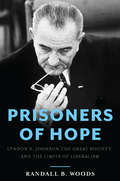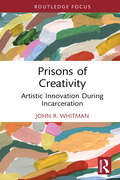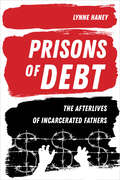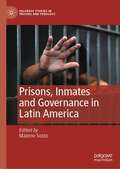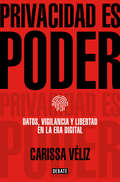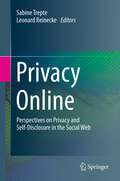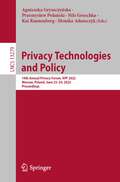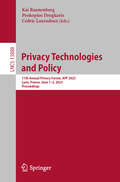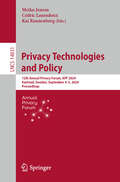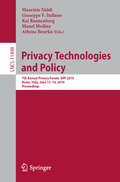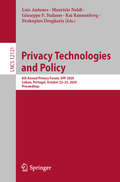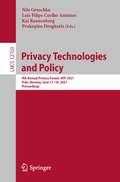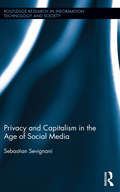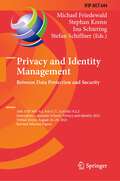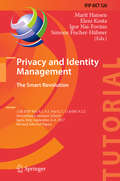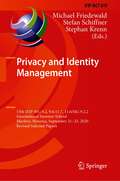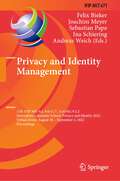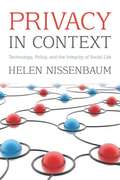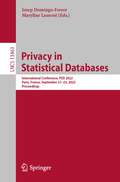- Table View
- List View
Prisoners Of Hate: The Cognitive Basis of Anger, Hostility, and Violence
by Aaron T. Beck"Prisoners of Hate offers a profound analysis of a most pressing human challenge: the causes—and prevention—of hatred. Of the many important books Aaron Beck has written, this may be his greatest gift to humanity." —Daniel Goleman, author of Emotional IntelligenceWorld-renowned psychiatrist Dr. Aaron T. Beck has always been at the forefront of cognitive therapy research, his approach being the most rapidly growing psychotherapy today. In his most important work to date, the widely hailed father of cognitive therapy presents a revolutionary look at destructive behavior—from domestic abuse to genocide to war—and provides a solid framework for remedying these crucial problems. In this book, Dr. Beck:Illustrates the specific psychological aberrations underlying anger, interpersonal hostility, ethnic conflict, genocide, and war;Clarifies why perpetrators of evil deeds are motivated by a belief that they are doing good;Explains how the offenders are locked into distorted belief systems that control their behavior and shows how the same distortions in thinking occur in a rampaging mob as in an enraged spouse;Provides a blueprint for correcting warped thinking and belief systems and, consequently, undercutting various forms of hostility; andDiscusses how the individual and society as a whole might use the tools of psychotherapy to block the psychological pathways to war, genocide, rape, and murder.
Prisoners of Hope: Lyndon B. Johnson, the Great Society, and the Limits of Liberalism
by Randall B. WoodsPresident Lyndon Johnson's Great Society was breathtaking in its scope and dramatic in its impact. Over the course of his time in office, Johnson passed over one thousand pieces of legislation designed to address an extraordinary array of social issues. Poverty and racial injustice were foremost among them, but the Great Society included legislation on issues ranging from health care to immigration to education and environmental protection. But while the Great Society was undeniably ambitious, it was by no means perfect. In Prisoners of Hope, prize-winning historian Randall B. Woods presents the first comprehensive history of the Great Society, exploring both the breathtaking possibilities of visionary politics, as well as its limits.Soon after becoming president, Johnson achieved major legislative victories with the 1964 Civil Rights Act and the 1965 Voting Rights Act. But he wasn't prepared for the substantial backlash that ensued. Community Action Programs were painted as dangerously subversive, at worst a forum for minority criminals and at best a conduit through which the federal government and the inner city poor could bypass the existing power structure. Affirmative action was rife with controversy, and the War on Poverty was denounced by conservatives as the cause of civil disorder and disregard for the law. As opposition, first from white conservatives, but then also some liberals and African Americans, mounted, Johnson was forced to make a number of devastating concessions in order to secure the future of the Great Society. Even as many Americans benefited, millions were left disappointed, from suburban whites to the new anti-war left to African Americans. The Johnson administration's efforts to draw on aspects of the Great Society to build a viable society in South Vietnam ultimately failed, and as the war in Vietnam descended into quagmire, the president's credibility plummeted even further.A cautionary tale about the unintended consequences of even well-intentioned policy, Prisoners of Hope offers a nuanced portrait of America's most ambitious--and controversial--domestic policy agenda since the New Deal.
Prisons After Woolf: Reform through Riot
by Michael Jenkins Elaine PlayerFor the past few years prisons have attracted much media attention, due to substantial increases in the prison population and the deteriorating conditions in which prisoners are held. In addition, there has been industrial action by prison officers and a series of disturbances and riots by prisoners. Following the riot at Strangeways prison in Manchester in 1990 Lord Justice Woolf was called to conduct an inquiry into the riots and their causes. Prisons After Woolf serves as a basic source of information on prison issues and reviews them in the light of the Woolf proposals. In so doing, its contributors, drawn from all areas of the legal and prison system, present an important broad perspective on the major questions in penology today.
Prisons We Choose to Live Inside (The CBC Massey Lectures)
by Doris LessingIn her 1985 CBC Massey Lectures Doris Lessing addresses the question of personal freedom and individual responsibility in a world increasingly prone to political rhetoric, mass emotions, and inherited structures of unquestioned belief. The Nobel Prize-winning author of more than thirty books, Doris Lessing is one of our most challenging and important writers.
Prisons of Creativity: Artistic Innovation During Incarceration
by John R. WhitmanSparking a discussion of the importance of creativity for the well-being of society, this book highlights and argues for the potential of those in prison to learn and exercise the skills of writing, visual arts, and music; to protect their intellectual property; and to distribute their works to the public, and the consequent benefits of their creative contribution to wider society.Focused on the premise that a nation’s well-being and competitive advantage in innovation are advanced by promoting the creative efforts of all its citizens without exclusion, including those residing in prisons, this book uses the United States as a case study to illuminate the potential among any nation’s prison population to contribute to its store of creative works. Arguing that creativity should be encouraged for the benefit of all, it offers a framework for how incarcerated individuals globally could be permitted to engage in learning and undertaking skills in the expressive arts to produce works for public dissemination. Supporting this argument, it explores and analyses the Intellectual Property clause of the Constitution of the United States.Emphasizing not just the internal but also the external value of creativity in prison, Prisons of Creativity widens and elevates the discourse concerning the institution of prison in society and its social goals. It will be of great value to anyone with an interest in arts in corrections, including educators and practitioners, professionals and policy makers within the criminal justice system, and students and scholars of criminology, criminal justice, and related areas.
Prisons of Debt: The Afterlives of Incarcerated Fathers
by Prof. Lynne HaneyA profound portrait of the hidden injustices that trap fathers in a cycle of punishment and debt. In the first study of its kind, sociologist Lynne Haney travels into state institutions across the country to document the experiences of the millions of fathers cycling through the criminal justice and child support systems. Prisons of Debt shows how these systems work together to create complex entanglements—rather than "piling up" in men's lives, these entanglements form feedback loops of disadvantage. The prison–child support pipeline flows in both directions, deepening parents' debt and criminal justice involvement. Through moving accounts of men struggling to be fathers from behind prison walls and under the weight of support debt, Prisons of Debt exposes how the criminalization of child support undermines the most essential of familial relationships. Haney argues that these state systems can end up producing exactly the kind of parent they fear and loathe: bitter, unreliable, and cyclical fathers. Based on observations of 1,200 child support cases and interviews with 145 indebted fathers in New York, California, and Florida, Prisons of Debt reveals the actual practices of child support adjudication and enforcement alongside the lived realities of fathers trapped in those systems. The result is a rigorously documented analysis of how poor men are too often denied their rights of citizenship and of fatherhood.
Prisons, Inmates and Governance in Latin America (Palgrave Studies in Prisons and Penology)
by Máximo SozzoThis edited collection addresses the topic of prison governance which is crucial to our understanding of contemporary prisons in Latin America. It presents social research from Nicaragua, the Dominican Republic, Venezuela, Colombia, Ecuador, Brazil, Peru, Uruguay and Argentina to examine the practices of governance by the prisoners themselves in each unique setting in detail. High levels of variation in the governance practices are found to exist, not only between countries but also within the same country, between prisons and within the same prison, and between different areas. The chapters make important contributions to the theoretical concepts and arguments that can be used to interpret the emergence, dynamics and effects of these practices in the institutions of confinement of the region. The book also addresses the complex task of explaining why these types of practices of governance happen in Latin American prisons as some of them appear to be a legacy of a remote past but others have arisen more recently. It makes a vital contribution to the fundamental debate for prison policies in Latin America about the alternatives that can be promoted.
Prisons, Politics and Practices in England and Wales 1945–2020: The Operational Management Issues
by David J. CornwellThis book presents both a survey of and commentary upon the penal process of England and Wales between 1945 and 2020 from the primary perspective of prisons and their operational management. Part I focusses on the extent to which governmental polities, changing concepts in penology and significant events affected the performance and management of prisons during four key periods: 1945-1991; 1991-1997; 1997-2007 and 2007-2020. Part II presents a vision for more effective operation of prisons within the wider penal process in the 2020s and beyond. It draws upon the author's academic insights and his experience as a former prison governor. This book speaks to those in the social sciences, law and politics and to professionals in government and in the penal system who are interested in reform.
Prius Or Pickup?: How the Answers to Four Simple Questions Explain America's Great Divide
by Marc Hetherington Jonathan Weiler“In this fascinating look at contemporary politics, [the authors] set out to explain what really causes the extreme political polarization seen today.” —Publishers WeeklyWhat’s in your garage: a Prius or a pickup? What’s in your coffee cup: Starbucks or Dunkin’ Donuts? What about your pet: cat or dog? As award-winning political scholars Marc Hetherington and Jonathan Weiler explain, even our smallest choices speak volumes about us—especially when it comes to our personalities and our politics. Liberals and conservatives seem to occupy different worlds because we have fundamentally different worldviews: systems of values that can be quickly diagnosed with a handful of simple questions, but which shape our lives and decisions in the most elemental ways. If we’re to overcome our seemingly intractable differences, Hetherington and Weiler show, we must first learn to master the psychological impulses that give rise to them, and to understand how politicians manipulate our mindsets for their own benefit.Drawing on groundbreaking original research, Prius or Pickup? provides the psychological key to America’s deadlocked politics, showing that we are divided not by ideologies but something deeper: personality differences that appear in everything from politics to parenting to the workplace to TV preferences, and that would be innocuous if only we could decouple them from our noxious political debate. “A fascinating way to look at the fracturing of a nation.” —Kirkus Reviews“An exceptionally insightful and entertaining exploration of the roots of tribalism in American (and European) society and politics, and its ominous consequences for democracy.” —Thomas E. Mann, Senior Fellow, Brookings Institution
Privacidad es poder: Datos, vigilancia y libertad en la era digital
by Carissa VélizSeleccionado por The Economist como uno de los libros del año. La guía definitiva para afrontar uno de los problemas más acuciantes de nuestro tiempo: la pérdida de la privacidad. Nos vigilan. Saben que estás leyendo estas palabras. Gobiernos y cientos de empresas nos espían: a ti y a todos tus conocidos. A todas horas, todos los días. Rastrean y registran todo lo que pueden: nuestra ubicación, nuestras comunicaciones, nuestras búsquedas en internet, nuestra información biométrica, nuestras relaciones sociales, nuestras compras, nuestros problemas médicos y mucho más. Quieren saber quiénes somos, qué pensamos, dónde nos duele. Quieren predecir nuestro comportamiento e influir en él. Tienen demasiado poder. Su poder proviene de nosotros, de ti, de tus datos. Recuperar la privacidad es la única manera de que podamos asumir de nuevo el mando de nuestras vidas y de nuestras sociedades. La privacidad es tan colectiva como personal, y es hora de retomar el control. Privacidad es poder es el primer libro que propone el fin de la economía de los datos. Carissa Véliz explica cómo nuestros datos personales están cediendo demasiado poder a las grandes empresas tecnológicas y a los gobiernos, por qué esto es importante y qué podemos hacer al respecto.
Privacy Online
by Sabine Trepte Leonard ReineckeCommunications and personal information that are posted online are usually accessible to a vast number of people. Yet when personal data exist online, they may be searched, reproduced and mined by advertisers, merchants, service providers or even stalkers. Many users know what may happen to their information, while at the same time they act as though their data are private or intimate. They expect their privacy will not be infringed while they willingly share personal information with the world via social network sites, blogs, and in online communities. The chapters collected by Trepte and Reinecke address questions arising from this disparity that has often been referred to as the privacy paradox. Works by renowned researchers from various disciplines including psychology, communication, sociology, and information science, offer new theoretical models on the functioning of online intimacy and public accessibility, and propose novel ideas on the how and why of online privacy. The contributing authors offer intriguing solutions for some of the most pressing issues and problems in the field of online privacy. They investigate how users abandon privacy to enhance social capital and to generate different kinds of benefits. They argue that trust and authenticity characterize the uses of social network sites. They explore how privacy needs affect users' virtual identities. Ethical issues of privacy online are discussed as well as its gratifications and users' concerns. The contributors of this volume focus on the privacy needs and behaviors of a variety of different groups of social media users such as young adults, older users, and genders. They also examine privacy in the context of particular online services such as social network sites, mobile internet access, online journalism, blogs, and micro-blogs. In sum, this book offers researchers and students working on issues related to internet communication not only a thorough and up-to-date treatment of online privacy and the social web. It also presents a glimpse of the future by exploring emergent issues concerning new technological applications and by suggesting theory-based research agendas that can guide inquiry beyond the current forms of social technologies.
Privacy Technologies and Policy: 10th Annual Privacy Forum, APF 2022, Warsaw, Poland, June 23–24, 2022, Proceedings (Lecture Notes in Computer Science #13279)
by Kai Rannenberg Nils Gruschka Agnieszka Gryszczyńska Przemysław Polański Monika AdamczykThis book constitutes the refereed conference proceedings of the 10th Annual Privacy Forum, APF 2022 in Warsaw, Poland in June 2022. The 8 full papers were carefully reviewed and selected from 38 submissions. The papers are organized in the area of privacy and data protection while focusing on privacy related application areas. A large focus of the 2022 conference was on the General Data Protection Regulation (GDPR).
Privacy Technologies and Policy: 11th Annual Privacy Forum, APF 2023, Lyon, France, June 1–2, 2023, Proceedings (Lecture Notes in Computer Science #13888)
by Kai Rannenberg Prokopios Drogkaris Cédric LauradouxThis book constitutes the refereed conference proceedings of the 11th Annual Privacy Forum, APF 2023 in Lyon, France in June 2023. The 8 full papers were carefully reviewed and selected from 37 submissions. The papers are organized in the following topical sections: Emerging Technologies and Protection of Personal Data, Data Protection Principles and Data Subject Rights, Modelling Data Protection and Privacy, and Modelling Perceptions of Privacy.
Privacy Technologies and Policy: 12th Annual Privacy Forum, APF 2024, Karlstad, Sweden, September 4–5, 2024, Proceedings (Lecture Notes in Computer Science #14831)
by Kai Rannenberg Meiko Jensen Cédric LauradouxThis book constitutes the refereed proceedings of the 12th Annual Privacy Forum on Privacy Technologies and Policy, APF 2024, held in Karlstad, Sweden, during September 4–5, 2024. The 12 full papers were carefully reviewed and selected from 60 submissions. This conference was established as an opportunity to bring together key communities, namely policy, academia, and industry, in the broader area of privacy and data protection while focusing on privacy-related application areas. Like in the previous edition, a large focus of the 2024 conference was on the General Data Protection Regulation (GDPR) and the emerging legislation around the European Data Spaces and Arti cial Intelligence. Chapter 3, 9, 12 are licensed under the terms of the Creative Commons Attribution 4.0 International License (http://creativecommons.org/licenses/by/4.0/). For further details see license information in the chapter.
Privacy Technologies and Policy: 7th Annual Privacy Forum, APF 2019, Rome, Italy, June 13–14, 2019, Proceedings (Lecture Notes in Computer Science #11498)
by Kai Rannenberg Manel Medina Maurizio Naldi Giuseppe F. Italiano Athena BourkaThis book constitutes the refereed conference proceedings of the 7th Annual Privacy Forum, APF 2019, held in Rome,Italy, in June 2019. The 11 revised full papers were carefully reviewed and selected from 49 submissions. The papers present original work on the themes of data protection and privacy and their repercussions on technology, business, government, law, society, policy and law enforcement bridging the gap between research, business models, and policy. They are organized in topical sections on transparency, users' rights, risk assessment, and applications.
Privacy Technologies and Policy: 8th Annual Privacy Forum, APF 2020, Lisbon, Portugal, October 22–23, 2020, Proceedings (Lecture Notes in Computer Science #12121)
by Kai Rannenberg Maurizio Naldi Giuseppe F. Italiano Luís Antunes Prokopios DrogkarisThis book constitutes the refereed conference proceedings of the 8th Annual Privacy Forum, APF 2020, held in Lisbon, Portugal, in October 2020.The 12 revised full papers were carefully reviewed and selected from 59 submissions. The papers are organized in topical sections on impact assessment; privacy by design; data protection and security; and transparency.
Privacy Technologies and Policy: 9th Annual Privacy Forum, APF 2021, Oslo, Norway, June 17–18, 2021, Proceedings (Lecture Notes in Computer Science #12703)
by Kai Rannenberg Nils Gruschka Prokopios Drogkaris Luís Filipe Coelho AntunesThis book constitutes the refereed conference proceedings of the 9th Annual Privacy Forum, APF 2021. Due to COVID-19 pandemic the conference was held virtually. The 9 revised full papers were carefully reviewed and selected from 43 submissions. The papers are organized in topical sections on Implementing Personal Data Processing Principles; Privacy Enhancing Technologies; Promoting Compliance with the GDPR.
Privacy and Capitalism in the Age of Social Media (Routledge Research in Information Technology and Society #18)
by Sebastian SevignaniThis book explores commodification processes of personal data and provides a critical framing of the ongoing debate of privacy in the Internet age, using the example of social media and referring to interviews with users. It advocates and expands upon two main theses: First, people’s privacy is structurally invaded in contemporary informational capitalism. Second, the best response to this problem is not accomplished by invoking the privacy framework as it stands, because it is itself part of the problematic nexus that it struggles against. Informational capitalism poses weighty problems for making the Internet a truly social medium, and aspiring to sustainable privacy simultaneously means to struggle against alienation and exploitation. In the last instance, this means opposing the capitalist form of association – online and offline.
Privacy and Identity Management. Between Data Protection and Security: 16th IFIP WG 9.2, 9.6/11.7, 11.6/SIG 9.2.2 International Summer School, Privacy and Identity 2021, Virtual Event, August 16–20, 2021, Revised Selected Papers (IFIP Advances in Information and Communication Technology #644)
by Stefan Schiffner Michael Friedewald Stephan Krenn Ina SchieringThis book contains selected papers presented at the 16th IFIP WG 9.2, 9.6/11.7, 11.6/SIG 9.2.2 International Summer School on Privacy and Identity Management, held online in August 2021.The 9 full papers included in this volume were carefully reviewed and selected from 23 submissions. Also included are 2 invited keynote papers and 3 tutorial/workshop summary papers. As in previous years, one of the goals of the IFIP Summer School was to encourage the publication of thorough research papers by students and emerging scholars. The papers combine interdisciplinary approaches to bring together a host of perspectives, such as technical, legal, regulatory, socio-economic, social or societal, political, ethical, anthropological, philosophical, or psychological perspectives.
Privacy and Identity Management. The Smart Revolution: 12th IFIP WG 9.2, 9.5, 9.6/11.7, 11.6/SIG 9.2.2 International Summer School, Ispra, Italy, September 4-8, 2017, Revised Selected Papers (IFIP Advances in Information and Communication Technology #526)
by Eleni Kosta Simone Fischer-Hübner Marit Hansen Igor Nai-FovinoThis book contains selected papers presented at the 12th IFIP WG 9.2, 9.5, 9.6/11.7, 11.6/SIG 9.2.2 International Summer School on Privacy and Identity Management, held in Ispra, Italy, in September 2017.The 12 revised full papers, 5 invited papers and 4 workshop papers included in this volume were carefully selected from a total of 48 submissions and were subject to a three-phase review process. The papers combine interdisciplinary approaches to bring together a host of perspectives: technical, legal, regulatory, socio-economic, social, societal, political, ethical, anthropological, philosophical, and psychological. They are organized in the following topical sections: privacy engineering; privacy in the era of the smart revolution; improving privacy and security in the era of smart environments; safeguarding personal data and mitigating risks; assistive robots; and mobility and privacy.
Privacy and Identity Management: 15th IFIP WG 9.2, 9.6/11.7, 11.6/SIG 9.2.2 International Summer School, Maribor, Slovenia, September 21–23, 2020, Revised Selected Papers (IFIP Advances in Information and Communication Technology #619)
by Stefan Schiffner Michael Friedewald Stephan KrennThis book contains selected papers presented at the 15th IFIP WG 9.2, 9.6/11.7, 11.6/SIG 9.2.2 International Summer School on Privacy and Identity Management, held in Maribor, Slovenia, in September 2020.*The 13 full papers included in this volume were carefully reviewed and selected from 21 submissions. Also included is a summary paper of a tutorial. As in previous years, one of the goals of the IFIP Summer School was to encourage the publication of thorough research papers by students and emerging scholars. The papers combine interdisciplinary approaches to bring together a host of perspectives, such as technical, legal, regulatory, socio-economic, social or societal, political, ethical, anthropological, philosophical, or psychological perspectives.*The summer school was held virtually.
Privacy and Identity Management: 17th IFIP WG 9.2, 9.6/11.7, 11.6/SIG 9.2.2 International Summer School, Privacy and Identity 2022, Virtual Event, August 30–September 2, 2022, Proceedings (IFIP Advances in Information and Communication Technology #671)
by Andreas Weich Sebastian Pape Joachim Meyer Ina Schiering Felix BiekerThis book contains selected papers presented at the 17th IFIP WG 9.2, 9.6/11.7, 11.6/SIG 9.2.2 International Summer School on Privacy and Identity Management, held online in August/September 2022. The 9 full papers and 5 workshop and tutorial papers included in this volume were carefully reviewed and selected from 23 submissions. As in previous years, one of the goals of the IFIP Summer School was to encourage the publication of thorough research papers by students and emerging scholars. The papers combine interdisciplinary approaches to bring together a host of perspectives, such as technical, legal, regulatory, socio-economic, social or societal, political, ethical, anthropological, philosophical, or psychological perspectives.
Privacy as Trust: Information Privacy for an Information Age
by Ari Ezra WaldmanIt seems like there is no such thing as privacy anymore. But the truth is that privacy is in danger only because we think about it in narrow, limited, and outdated ways. In this transformative work, Ari Ezra Waldman, leveraging the notion that we share information with others in contexts of trust, offers a roadmap for data privacy that will better protect our information in a digitized world. With case studies involving websites, online harassment, intellectual property, and social robots, Waldman shows how 'privacy as trust' can be applied in the most challenging real-world contexts to make privacy work for all of us. This book should be read by anyone concerned with reshaping the theory and practice of privacy in the modern world.
Privacy in Context
by Helen NissenbaumPrivacy is one of the most urgent issues associated with information technology and digital media. This book claims that what people really care about when they complain and protest that privacy has been violated is not the act of sharing information itself-most people understand that this is crucial to social life -but the inappropriate, improper sharing of information. Arguing that privacy concerns should not be limited solely to concern about control over personal information, Helen Nissenbaum counters that information ought to be distributed and protected according to norms governing distinct social contexts-whether it be workplace, health care, schools, or among family and friends. She warns that basic distinctions between public and private, informing many current privacy policies, in fact obscure more than they clarify. In truth, contemporary information systems should alarm us only when they function without regard for social norms and values, and thereby weaken the fabric of social life.
Privacy in Statistical Databases: International Conference, PSD 2022, Paris, France, September 21–23, 2022, Proceedings (Lecture Notes in Computer Science #13463)
by Josep Domingo-Ferrer Maryline LaurentThis book constitutes the refereed proceedings of the International Conference on Privacy in Statistical Databases, PSD 2022, held in Paris, France, during September 21-23, 2022.The 25 papers presented in this volume were carefully reviewed and selected from 45 submissions. They were organized in topical sections as follows: Privacy models; tabular data; disclosure risk assessment and record linkage; privacy-preserving protocols; unstructured and mobility data; synthetic data; machine learning and privacy; and case studies.

